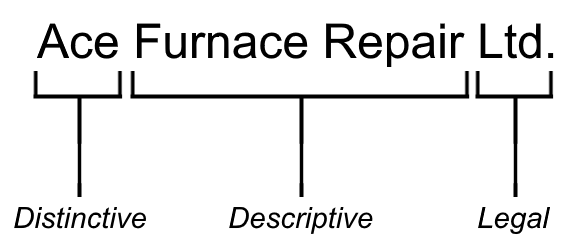Search Knowledge Base by Keyword
Inc. vs. Ltd. vs. Corp.
What's the Difference?
Corporations registered in Canada are generally required to have a corporate name that includes all of the following elements:
- a descriptive element (something that describes the business);
- a distinctive element (something that makes the name unique); and
- a legal element (confirming to the public that the business is officially incorporated).
In the name "Ace Furnace Repair Ltd.", the word "Ace" is the distinctive element, "Furnace Repair" is the descriptive element, and "Ltd." is the legal element.

Although the options available for the descriptive and distinctive elements are almost limitless, the list of available options for the legal element of a corporate name in Canada are typically limited to the following:
- Limited or Ltd.
- Incorporated or Inc.
- Corporation or Corp.
A question we're often asked is whether there is any difference between the different legal elements.
In other words, is a corporation with a name ending with Inc. different from a corporation with a name that ends with Ltd. or Corp.?
The answer is no. There is no difference between the corporations in Canada. They have the same rights, responsibilities, and status in law. They also offer the same liability protections.
Which Should You Choose?
The choice of legal element for your business name is entirely up to you.
Although the cost of incorporating a business will vary depending upon the service provider you choose, and whether you decide to do-it-yourself, or to incorporate with the help of an incorporation lawyer, the choice of legal element should not change the amount that you pay for incorporation.
While Inc. and Ltd. are the most commonly chosen names, the decision comes down to whatever sounds best to you. Even though Corp. is used less often, there are some situations where it sounds the best.
If you're not sure, ask family and friends what they think.
If you'd like some tips for choosing a great name for your business, check out this post.
The One Exception!
The only time that we recommend one choice of legal element over another when choosing a corporate name is for numbered corporations.
Although numbered corporations are automatically assigned a number, the legal element can usually be chosen by the incorporator.
If you're incorporating a numbered corporation instead of a named corporation (which might not be the best idea), our recommendation is to go with Ltd. as the legal element. That's because Ltd. is the most commonly used legal element for numbered corporations in Canada (by far), and using something different often leads to confusion and errors. This is something that we have witnessed first hand on multiple occasions.
If you want to know more about numbered corporations, and whether you should incorporate a numbered corporation, you should check our post covering the 6 key questions to ask before incorporating a business.
Thinking about incorporating?
Find out if incorporation is the right choice for your business.
Start the QuizWhat About ULC, LLC, C-Corp, S-Corp and LLP?
ULC stands for Unlimited Liability Company. A few Canadian Provinces (BC, Alberta and Nova Scotia) allow for the incorporation of ULC's, however, their main use is as a tax planning vehicle for US corporations with Canadian operations.
ULC's are rarely used for businesses in Canada because they provide unlimited liability for their shareholders. This is the opposite of what most business owners want.
ULC's are sometimes confused for LLC's, which are something completely different. LLC stands for Limited Liability Company. LLC's are very common in the United States, but are not available for registration as a corporate legal entity in Canada.
Other corporation types that are available in the United States, but not in Canada include C-Corporations and S-Corporations. The C and S stand for specific sections of the US Internal Revenue Code are not applicable in Canada.
LLP stands for Limited Liability Partnership. The rules regarding who may register an LLP vary in each Province, however, they are usually restricted to professional service partnerships such as accounting and law firms. They are not suitable for most small businesses.
To see a detailed list of business entity types available in various countries around the world, visit this Wikipedia page.
If you have additional questions about why, how, where or when to incorporate a business in Canada, we can help. Click on the Book a Consultation button below to book a half-hour phone consultation with an Alberta business lawyer from All In Business Law.
